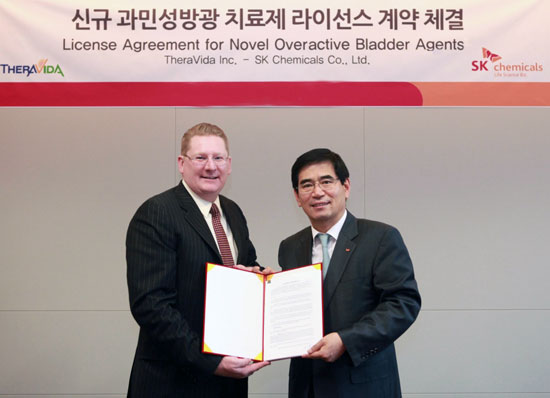● SK chemicals Introduces an American Overactive Bladder Treatment into Korea
- SK chemicals signs a licensing agreement with TheraVida to launch the drug
in Korea in 2016.
- The new drug has no side effects and is made more convenient for patients to take.
SK chemicals announced on April 1 that it successfully signed a licensing agreement, which gives the company an exclusive right to launch and distribute a U.S.-made treatment for the overactive bladder.
The agreement gives SK chemicals an exclusive right to develop, manufacture, and distribute in Korea THVD-201 (tolterodine 2 mg and pilocarpine 9 mg) and THVD-202 in collaboration with TheraVida, Inc., a U.S.-based company.
While the two drugs are the same in substance, THVD-201 needs to be taken twice a day, while THVD-202 can be taken just once a day.
SK chemicals plans to complete the process of technology transfer from TheraVida this year, begin the clinical trials of the drug in 2014, and launch THVD-201 in Korea in 2016.
South Korea is the most rapidly aging member state of the OECD and is witnessing a dramatic increase in the number of patients diagnosed with overactive bladder syndrome. The number of prescriptions of treatments for the disease has grown at an average rate of 12% a year over the last five years, with the market estimated to amount to KRW 49.2 billion today (according to the 2011 UBIST data).
According to the data on the prevalence rate of the overactive bladder in Korea published in the International Journal of Urology in 2006, 14.3% of Korean women and 10.0% of Korean men suffer from the difficulties created by an overactive bladder; in particular, 28.4% of these women experience incontinence.
Patients with overactive bladders have difficulty controlling urine excretion. The inability to control urine excretion can severely limit their social functions and seriously undermine their quality of life. Another academic article published in Korea revealed that KRW 89.6 billion had been spent, as of 2007, on diagnostics, treatments, and other social overhead costs with respect to an overactive bladder.
Anticholinergic drugs that have been traditionally prescribed for overactive bladders are known to cause severe thirsts and dryness of the mouth, thus causing difficulty in eating and drinking for long periods of time.
THVD-201 and THVD-202 that SK chemicals has decided to import have unique combinations of the anticholinergic agent, tolterodine, with the saliva-inducing agent, pilocarpine, that were achieved by TheraVida’s original technology. The drugs thus significantly reduce risks of thirst.
A two-phase clinical study of THVD-201, conducted in Australia, New Zealand, and South Korea, revealed that the drug was as effective as other anticholinergic drugs in treating overactive bladders, while improving the thirst problems to a clinically significant extent.
CEO Lee In-seok of SK chemicals commented, “SK chemicals is working hard to improve the quality of life for the aging population of Korea. The recent collaboration with TheraVida will allow us to make a significant progress in the treatment of patients with overactive bladders and incontinence.”
Signs and symptoms of an overactive bladder include theuncontrollable urge to urinate, urinary incontinence, increasingly frequent visits to the bathroom (more than eight times a day), and increasing urge to urinate while asleep.
Partner Overview: TheraVida, Inc. was established in the United States in 2005 and has been specializing in developing composite medical substances that offer the same medical effects as standard treatments with improved safety and efficacy. THVD-201 for treating the overactive bladder is one of the best-known products of the company and is now getting ready for additional multinational clinical trials (www.theravida.com).

[Caption] CEO Lee In-seok of SK chemicals and CEO Roger S. Flugel of TheraVida after signing their latest licensing agreement.